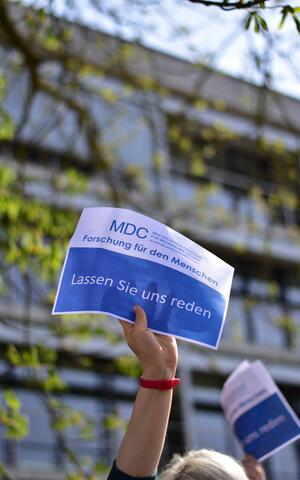No “heart of stone”
The Max Delbrück Center for Molecular Medicine in the Helmholtz Association (MDC), Berlin, and its employees take objective, professional criticism of animal studies seriously and are open to dialogue on this matter. The campaign being conducted by Doctors Against Animal Experiments Germany involves personally and generally vilifying individual people by awarding a “Herz aus Stein” (Heart of Stone) for a particular animal study. “This kind of criticism is not acceptable,” says Martin Lohse, Chairman of the Board of the MDC. “We distance ourselves from it both as scientists and as an institution as a whole.” In addition, the reasoning cited in the populist online poll is based on information taken out of context.
At the MDC, researchers from around the world are analyzing how the body works, both when it is healthy and when it is ill. The MDC’s mission includes ensuring that discoveries about fundamental mechanisms benefit patients as soon as possible. “We conduct research in the interest of patients, the elderly, and children – groups that lack a strong lobby. Finding and investigating new therapeutic possibilities for these groups is part of the mandate given to us by the government and society,” says Martin Lohse.
The findings from the study published by Gary Lewin’s research team and their cooperation partners – the one being criticized by Doctors Against Animal Experiments Germany – aim, for example, to help protect patients’ hearts and brains after heart attacks and strokes. In such cases, cells are threatened by lack of oxygen, which can have devastating consequences for patients. The study described a previously unknown defense mechanism against oxygen deficiency in naked mole rats. The road to developing a therapy for humans might be long, but the hope for such a therapy has found a large and positive echo in the scientific community as well as in the general public. News media around the world reported on the discovery.
“The Helmholtz Association is the largest scientific organization in Germany and as such contributes to solving the major challenges facing society, science, and industry,” says Otmar D. Wiestler, President of the Helmholtz Association. “Within the field of health research, we are developing innovative diagnostics and treatments for complex diseases such as cancer, cardiovascular disorders, Alzheimer’s and Parkinson’s for the benefit of the large number of affected patients. Animal studies play a necessary and indispensable part in answering some research questions. Our researchers always maintain the highest ethical standards when working with animals. Prior to each study, for example, we undertake a detailed assessment of the research question to clarify whether animal experiments are actually unavoidable. This was given responsible consideration in the study on naked mole rats that was commented on. We conduct animal experiments only if there is no alternative. We are also rigorously monitored by external government regulators. It is therefore absolutely unacceptable to us for individual scientists to be discredited publicly.”
The MDC is committed to the 3Rs principle of reduce, replace, refine. Its objective is to avoid and minimize animal suffering. Furthermore, the researchers at the Center are constantly questioning the status quo. At a conference in fall of 2017 jointly organized by the British animal welfare organization Royal Society for the Prevention of Cruelty to Animals (RSPCA) and the MDC, the Center’s researchers shared ideas with experts from across Europe about what can be done to reduce severe suffering in animal experiments. In 2016, only a fraction of the animal experiments conducted at the MDC in Berlin fell under the category of “severe suffering” (0.8 percent, the average in Germany is 6 percent).
In most cases, the research labs at the MDC begin their research with cell cultures or computer models. They develop new methods for simulating medical problems using stem cells and other technologies.
However, it is often not possible to test a mechanism without animal studies. “We believe that findings from animal studies enable us all to lead longer and healthier lives. At the present time, many questions can only be answered through animal studies,” says Martin Lohse. “Not everyone shares our opinion, and we have to accept that. But it is essential that we engage in respectful treatment of one another even in this discussion.




